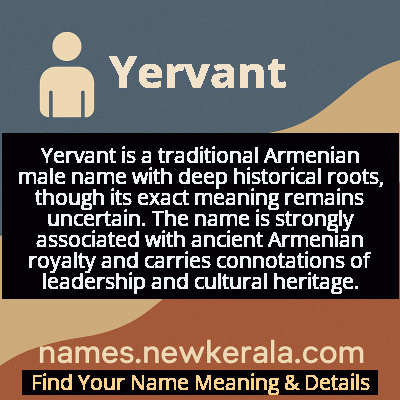Yervant Name Meaning & Details
Origin, Popularity, Numerology Analysis & Name Meaning of Yervant
Discover the origin, meaning, and cultural significance of the name YERVANT. Delve into its historical roots and explore the lasting impact it has had on communities and traditions.
Name
Yervant
Gender
Male
Origin
Armenian
Lucky Number
6
Meaning of the Name - Yervant
Yervant is a traditional Armenian male name with deep historical roots, though its exact meaning remains uncertain. The name is strongly associated with ancient Armenian royalty and carries connotations of leadership and cultural heritage.
Yervant - Complete Numerology Analysis
Your Numerology Number
Based on Pythagorean Numerology System
Ruling Planet
Venus
Positive Nature
Harmonious, responsible, caring, and artistic.
Negative Traits
Overly idealistic, superficial, possessive, or jealous.
Lucky Colours
Pink, turquoise.
Lucky Days
Friday.
Lucky Stones
Diamond, turquoise.
Harmony Numbers
2, 3, 9.
Best Suited Professions
Artists, musicians, teachers, healthcare workers.
What People Like About You
Warmth, nurturing nature, artistic flair.
Famous People Named Yervant
Yervant Odian
Writer and Satirist
One of Armenia's most prominent satirical writers and journalists
Yervant Manaryan
Footballer
Professional footballer for Armenian national team and various clubs
Yervant Terzian
Astronomer
Renowned astronomer and professor at Cornell University
Yervant Gianikian
Filmmaker
Experimental filmmaker known for archival film works
Name Variations & International Equivalents
Click on blue names to explore their detailed meanings. Gray names with will be available soon.
Cultural & Historical Significance
Extended Personality Analysis
Individuals named Yervant are typically associated with strong leadership qualities, determination, and deep cultural awareness. They often exhibit a natural authority and confidence that stems from the name's royal historical connections, combined with practical wisdom and strategic thinking. Their personality is frequently characterized by loyalty to family and community, traditional values, and a protective nature toward those they care about. Many Yervants demonstrate remarkable resilience in facing challenges, reflecting the historical endurance of Armenian culture itself. They tend to balance respect for tradition with adaptability to modern circumstances, making them effective in both preserving cultural heritage and navigating contemporary life. Their strong sense of identity and purpose often inspires respect and trust from others.
Modern Usage & Popularity
In contemporary usage, Yervant maintains its status as a traditional Armenian name with strong cultural connotations, though it appears less frequently than more modern Armenian names. Its usage is particularly notable among Armenian diaspora communities worldwide, where it serves as a meaningful connection to heritage and ancestral roots. The name experiences periodic resurgences during cultural revival movements and is often chosen by families with strong historical awareness or those emphasizing their Armenian identity. While not ranking among the most popular names in modern Armenia, Yervant continues to be recognized as a dignified, classic choice that carries significant cultural weight and historical resonance, ensuring its continued presence in Armenian naming traditions.
Symbolic & Spiritual Meanings
Symbolically, Yervant represents the enduring spirit of Armenian culture and historical continuity. The name carries deep metaphorical meanings of resilience, heritage preservation, and cultural identity that has withstood centuries of challenges. It symbolizes the unbroken chain connecting modern Armenians to their ancient ancestors and royal traditions. Metaphorically, Yervant embodies the concept of rootedness - being firmly planted in tradition while having the strength to adapt and grow. The name serves as a living monument to Armenia's historical journey, representing both the glory of ancient kingdoms and the perseverance through subsequent trials. It stands as a testament to cultural survival and the transmission of identity across generations.

